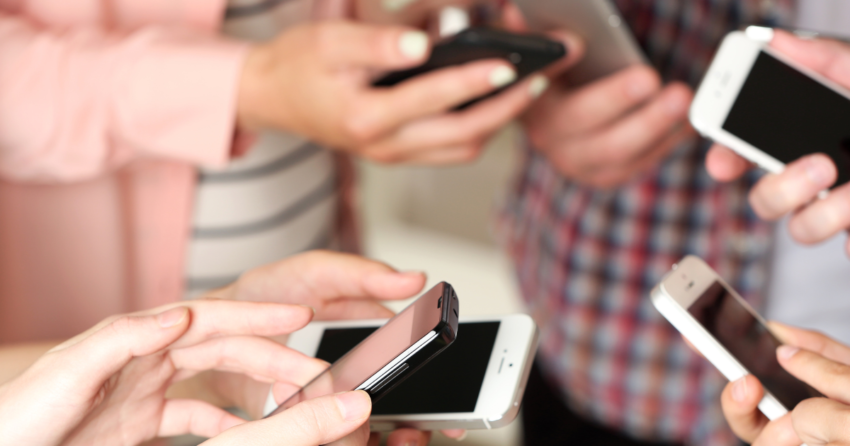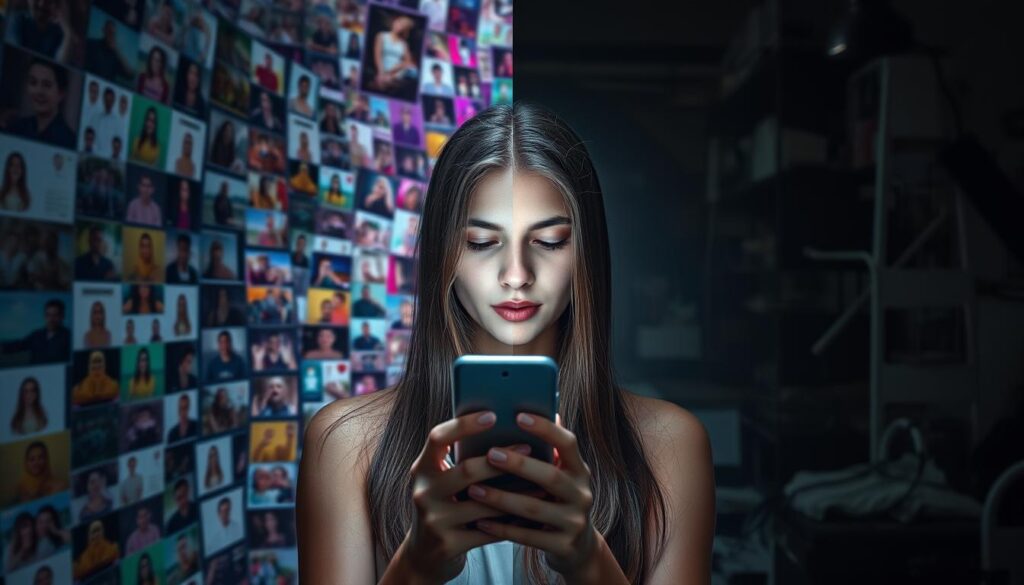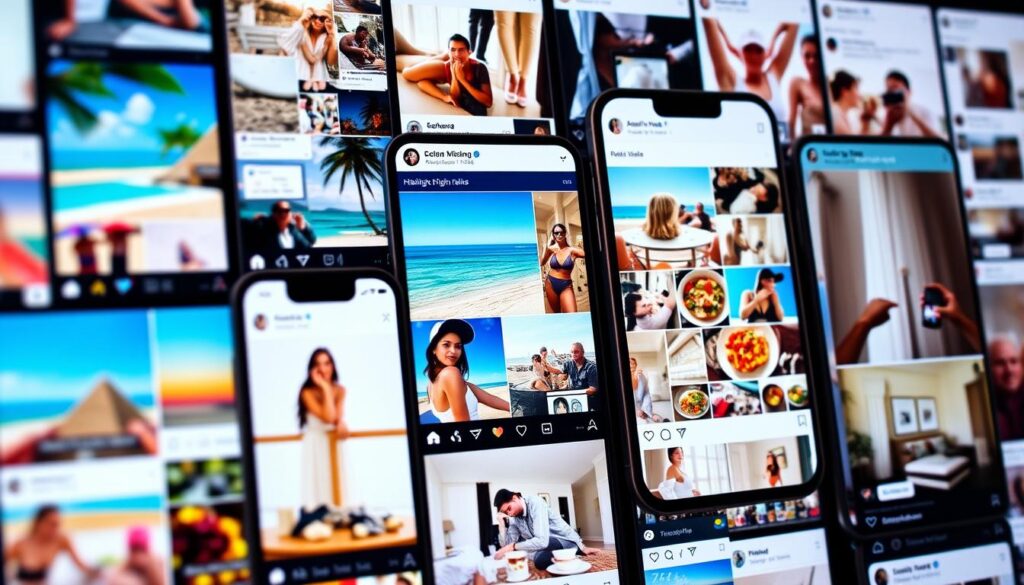The Comparison Trap: How Social Media Fuels Feelings of Inadequacy

We’ve all done it. Scrolled through that endless feed, comparing ourselves to someone else’s highlight reel. Their picture-perfect vacations, flawless outfits, and seemingly effortless success can leave us feeling… inadequate. Like we’re somehow falling short, not doing enough, not being enough. It’s a trap, a comparison trap, and social media is the bait.

Did you know that studies show a direct correlation between time spent on social media and decreased self-esteem? Or that the average person spends nearly two and a half hours on social media every single day? It’s no wonder we’re constantly bombarded with images of seemingly perfect lives, leaving us to question our own.
But here’s the secret: social media is like a heavily edited movie trailer. It shows you the best two minutes of a two-hour film, leaving out all the bloopers, the retakes, and the mundane moments in between. That girl with the seemingly perfect life might be struggling with anxiety behind the scenes, or the guy with the dream job might be battling burnout.
I’ve been there too. Scrolling through Instagram, comparing my behind-the-scenes to everyone else’s highlight reel, and feeling like I wasn’t measuring up. But I’ve learned that true beauty and success come from within, from embracing our unique journey and celebrating our individuality.
Remember, there’s only one you. Your path is yours alone, and it’s beautiful precisely because no one else can walk it. Your superpower lies in your authenticity, in being unapologetically you. Let’s break free from the comparison trap together and discover the true power of self-love and acceptance in a world obsessed with social media perfection.
The Rise of Social Media and Social Comparison
Social media like Facebook, Twitter, and Instagram changed how we connect. These sites let us share moments and keep up with friends. But, they also make us compare ourselves to others more than ever.
The Pervasiveness of Social Media Platforms
In Australia, 90% of young adults use Instagram, Facebook, and TikTok. These sites make us see others’ perfect lives. This makes us feel not good enough and want to be like them.
The Inherent Human Tendency for Social Comparison
Comparing ourselves to others is part of being human. It’s in our nature to see where we stand in society. This helps us understand who we are and our place in the world.
But, comparing ourselves to the best can be bad. It can lead to feeling sad and not confident. Too much time on social media can make these feelings worse.
“Social media usage in both genders is linked to depression and low self-esteem.”
Social media and our natural desire to compare have created a big problem. It makes us focus too much on being better than others. We need to understand this to stay healthy online.
The Negative Impact Of Social Comparison On Mental Health
Seeing others’ perfect lives on social media can hurt our mental health. We might feel bad about ourselves when we compare. This can make us feel sad, anxious, and even think about harming ourselves.
Low Self-Esteem and Body Image Issues
Young women often feel bad about themselves when they compare. They might feel like they don’t look good enough. This can lead to low self-esteem and body image problems.
Increased Depression, Anxiety, and Suicidal Thoughts
Comparing ourselves to others can make us feel depressed and anxious. It’s especially hard for young women. They might feel like they’re smiling on the outside but are really struggling inside.
| Statistic | Findings |
|---|---|
| Studies on social comparison and mental health | Social comparison has been found to have a positive association with depression and anxiety in clinical populations. Studies have shown that social comparison orientation is a risk factor for the development of depressive symptoms and disordered eating among women aged 12-24. |
| Correlation between social comparisons on social media and mental health | Reports of social comparisons made on social media have been correlated with poor subjective well-being and increased rates of depression and self-harm, especially among young women. |
| Prevalence of “smiling depression” | The phenomenon of “smiling depression,” where individuals appear happy online but are actually struggling with mental health issues, underscores the negative influence of social media and social comparison on our psychological well-being. |
The harm of social comparison on our mental health is real. It’s especially tough for those who are already vulnerable. We need to find ways to accept ourselves and deal with these feelings in a healthy way.
The Curated Reality of Social Media
Social media is everywhere in our lives. It shapes how we see and interact with the world. But, what we see on these platforms isn’t always real. The curated reality of social media is a highlight reel that hides the real struggles and flaws we all face.
People on social media share only the best parts of their lives. This creates a distorted perception of how others live. Social media algorithms make this seem like the norm, not the exception.
Seeing these idealized lives can make us feel bad about ourselves. It makes us want to be like others, but it’s hard. This can hurt our mental health, causing low self-esteem, depression, and anxiety.

“The highlight reel on social media creates a distorted perception of reality, fueling feelings of inadequacy and dissatisfaction.”
To break free from this trap, we need to understand social media’s curated nature. We should aim for a more real and balanced use of these platforms. By being careful about what we see and share, we can build a healthier relationship with social media. We can focus on being our true selves, rather than seeking approval from others.
Overcoming the Comparison Trap
Starting to overcome the comparison trap means being true to yourself. Social media makes us feel bad about ourselves. But, by changing how we think, we can escape this trap.
Embracing Authenticity and Self-Acceptance
Social media shows only the best parts of people’s lives. But, everyone has their own story. Don’t compare your life to someone else’s perfect image. Celebrate your own wins and be kind to yourself.
Cultivating Genuine Self-Worth
Constantly comparing ourselves can make us feel less worthy. To fight this, write down things you’re thankful for. Do things that make you happy, not just to impress others.
It’s a long journey to break free from comparison. But, by being true to yourself and valuing your worth, you can find happiness on your own terms.

The Role of Algorithms and Advertising
Social media platforms and their algorithms play a big role in the comparison trap. These algorithms show us content that makes us feel strong emotions. This often includes posts that show perfect lives or beauty standards that are hard to reach.
Users see a lot of content that makes them feel not good enough. This can lead to feeling bad about themselves and comparing themselves to others.
Also, the ads on social media make things worse. Advertisers use our data and algorithms to show us things that fit their goals. This can include ads for beauty or lifestyles that are not real.
This affects our mental health a lot. Seeing only the best parts of others’ lives can make us feel alone and unhappy. It can also make us feel bad about ourselves.
To fight this, we need to understand how social media works. We should also take care of our digital health. By knowing how these systems work, we can avoid bad content and take care of our minds.
| Key Statistic | Value |
|---|---|
| Social media users worldwide | 3.78 billion as of 2021 |
| Average time spent on social media per day | 145 minutes |
| Negative mental health impacts of social media | Loneliness, anxiety, fear of missing out, social comparison, depression |
“Social media algorithms are designed to keep users engaged for long periods of time by providing personalized content tailored to their interests. This can lead to the prioritization of content that generates high levels of engagement, even if it is harmful or negative.”
Unhealthy Social Comparison Across the Lifespan
Young adults and teenagers feel the sting of social comparison a lot. They are figuring out who they are and what they want. Seeing others’ perfect lives on social media can hurt their self-esteem and body image. This can harm their mental health for a long time.
The Impact on Young Adults and Teenagers
Young people are more hurt by social comparison. During the COVID-19 pandemic, they felt less happy and more sad. This is because they struggle to handle their emotions well.
Adolescence is a tough time for mental health. Teens often can’t manage their feelings as well as kids or adults. This can lead to more depression and anxiety.
Teens who had trouble with emotions before the pandemic got worse during it. Not being able to control feelings makes social comparison even harder. This can make them feel less good about themselves.
| Age Group | Impact of Social Comparison | Key Findings |
|---|---|---|
| Young Adults | Decreased self-esteem, body image issues, and mental health problems |
|
| Teenagers | Increased mental health issues, such as depression and anxiety |
|
It’s clear that social comparison affects people at different ages. But it hits young adults and teenagers especially hard. We need to help them deal with this. By teaching them to manage their emotions, we can protect their mental health and self-esteem.
“The constant exposure to the perceived successes and idealized lives of peers on social media can significantly affect their self-esteem, body image, and overall mental well-being, potentially leading to long-lasting consequences.”
Conclusion
Social media can really hurt your mental health. It makes us compare ourselves to others. This can lead to feeling bad about ourselves.
But, we can fight this feeling. By being true to ourselves and focusing on growing, we can win. Our worth isn’t based on what others post online.
So, let’s celebrate our wins and be thankful. Let’s decide what makes us happy, not others. This way, we can be happy and free from comparing ourselves.



